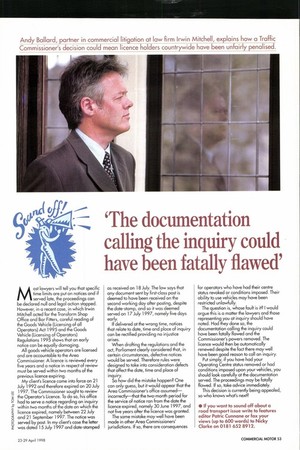The documentation calling the inquiry could have been fatally flawed'
Page 49

If you've noticed an error in this article please click here to report it so we can fix it.
Andy Ballard, partner in commercial litigation at law firm Irwin Mitchell, explains how a Traffic Commissioner's decision could mean licence holders countrywide have been unfairly penalised.
Most lawyers will tell you that specific time limits are put on notices and if served late, the proceedings can be declared null and legal action stopped. However, in a recent case, in which Irwin Mitchell acted for the Transform Shop Office and Bar Fitters, careful reading of the Goods Vehicle (Licensing of all Operators) Act 1995 and the Goods Vehicle (Licensing of Operators) Regulations 1995 shows that an early notice can be equally damaging. All goods vehicle operators are licensed and are accountable to the Area Commissioner. A licence is reviewed every five years and a notice in respect of review must be served within two months of the previous licence expiring. My client's licence came into force on 21 July 1992 and therefore expired on 20 July 1997. The Commissioner sought to review the Operator's Licence. To do so, his office had to serve a notice regarding an inquiry within two months of the date on which the licence expired, namely between 22 July and 21 September 1997. The notice was served by post. In my client's case the letter was dated 15 July 1997 and date-stamped as received on 18 July. The law says that any document sent by first-class post is deemed to have been received on the second working day after posting, despite the date-stamp, and so it was deemed served on 17 July 1997, namely five days early. If delivered at the wrong time, notices that relate to date, time and place of inquiry can be rectified providing no injustice arises.
When drafting the regulations and the act, Parliament clearly considered that, in certain circumstances, defective notices would be served. Therefore rules were designed to take into consideration defects that affect the date, time and place of inquiry. So how did the mistake happen? One can only guess, but it would appear that the Area Commissioner's office assumedincorrectly—that the two-month period for the service of notice ran from the date the licence expired, namely 30 June 1997, and not five years after the licence was granted.
The same mistake may well have been made in other Area Commissioners' jurisdictions. If so, there are consequences for operators who have had their centre status revoked or conditions imposed. Their ability to use vehicles may have been restricted unlawfully. The question is, whose fault is it? I would argue this is a matter the lawyers and those representing you at inquiry should have noted. Had they done so, the documentation calling the inquiry could have been fatally flawed and the Commissioner's powers removed. The licence would then be automatically renewed despite the fact there may well have been good reason to call an inquiry. Put simply, if you have had your Operating Centre status removed or had conditions imposed upon your vehicles, you should look carefully at the documentation served. The proceedings may be fatally flawed. If so, take advice immediately.
This decision is currently being appealed, so who knows what's next?
• If you want to sound off about a road transport issue write to features editor Patric Cunnane or fax your views (up to 600 words) to Nicky Clarke on 0181 652 8912.










































































































